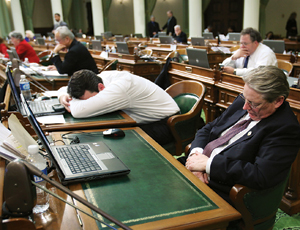California was poised to lay off 10,000 employees and pull the plug on 275 transportation infrastructure projects when a divided Legislature in the early morning hours of Feb. 19 approved a new budget that plugs the state’s $41-billion deficit.
However, the fiscal relief is temporary. The state is still teetering, and it could be several weeks before the Dept. of Finance’s cash-flow status is clear. Any positive effects of the $787-billion federal American Recovery and Reinvestment Act cannot be measured until President Barack Obama’s plan is put in place.

The new budget includes $15 billion in cuts, $11.4 billion in borrowing, $12.8 billion in temporary taxes and $2 billion in funds from the federal stimulus. Public education took a big hit, as the Legislature cut $18.4 billion from the proposed $58.1-billion budget.
Currently, the state is buying itself time by delaying payments to local governments and state contractors. Taxpayers refunds are being delayed, says state Controller John Chiang. In February alone, Chiang says the state delayed paying out $3.3 billion for its obligations.
The state will also continue furloughing its 238,000 employees two Fridays a month for the time being.
According to the Associated General Contractors of California, the state stands to receive nearly $5 billion in new construction investment as part of a broader economic stimulus package enacted by President Obama. The state’s stimulus share would include $2.8 billion in transportation, $598 million in water infrastructure and nearly $1.6 billion for education. The federal plan will pay for K-12 modernization projects but not for new school construction.
The Dept. of Transportation and California Transportation Commission are planning how to use state and new federal funds. CTC is the state agency that controls funding for Caltrans projects.
Annette Gilbertson, CTC associate deputy director, says the commission approved an initial level of $500 million in federal stimulus funding for the State Highway Operation and Protection Program. SHOPP is responsible for funding Proposition 1B projects. California voters approved that infrastructure improvement initiative in November 2006.
Some SHOPP projects include two totaling nearly $134 million on Los Angeles’ Interstate 710 freeway. Another project, Alameda County’s I-680 southbound roadway rehabilitation project, is pegged at $72 million.
"Over the next couple of weeks the commission will be working with Caltrans and regional transportation agencies on the formula split of the remaining funds," says Gilbertson. Under existing state law, the stimulus funds will be distributed through several transportation fund programs, she adds.
Two-thirds will move through SHOPP and the state transportation improvement program without allocation. The surface transportation program will parcel out 30% of the total regionally, based on population, with nearly a four-fifths share going to urban areas. CTC’s transportation enhancement program will push 3% through SHOPP and STIP.
Gilbertson says there is broad support for making 62.5% of the funds available for suballocation, with the remaining amount available to the state. "There was also strong support of proposing state legislation to distribute all stimulus funds through a modified surface transportation program process," she says.
Regional transportation boards now are solidifying their project lists in anticipation of the federal stimulus funds. The Sacramento Area Council of Governments, for example, authorized $32 million for road rehabilitation in Sacramento, Sutter, Yolo and Yuba counties.
Statewide, Gov. Arnold Schwarzenegger (R) and Caltrans have refused to provide a detailed "ready-to-go" list of projects, fearing a backlash from local communities if a listed project is turned down for funding.

Post a comment to this article
Report Abusive Comment